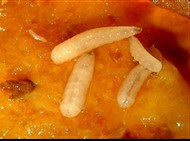MIAMI - U.S. Customs and Border Protection (CBP) agriculture specialists working at Miami International Airport seized dozens of figs from a passenger arriving on a flight from Jordan last month. After suspecting the passenger’s fruit might be infected with a dangerous pest, agriculture specialists proceeded to analyze the figs and upon further examination found two live larvae which were later identified as Ceratitis capitata (Wiedemann) (Tephritidae) or Mediterranean fruit fly.

International Airport
“Given that the Mediterranean fruit fly is one of the world’s most destructive agriculture pests, this is an extremely important find,” said Miami/Tampa Director of Field Operations Diane J. Sabatino. “If this Mediterranean fruit fly were to take hold in Florida, the estimated agricultural and economic loss would be devastating and would ultimately affect the consumer through higher prices at the supermarket.”
According to the U.S. Department of Agriculture, fruit fly larvae can cause fruit and vegetables to turn into a soft, mushy mess. Adult female fruit flies lay eggs in the flesh of ripening and ripe fruits and vegetables. Once the eggs hatch, the larvae begin to feed within the fruit, causing it to ripen prematurely and rot. A fruit fly infestation can cause hundreds of millions of dollars a year in lost income and eradication costs and management to the fruit production industries.
CBP agriculture specialists receive extensive training and experience in the biological sciences and agricultural inspection. On a typical day, they inspect almost 1 million people as well as air and sea cargo imported to the United States and intercept 4,379 prohibited meat, plant materials or animal products, including 440 insect pests nationwide.
To learn more about CBP’s agriculture protection mission, visit Protecting Agriculture on the CBP website.
U.S. Customs and Border Protection operations in Florida include travel and trade facilitation and securing over 1,200 miles of the coastal border. Follow @CBPFlorida on Twitter for real-time updates.


